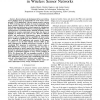Free Online Productivity Tools
i2Speak
i2Symbol
i2OCR
iTex2Img
iWeb2Print
iWeb2Shot
i2Type
iPdf2Split
iPdf2Merge
i2Bopomofo
i2Arabic
i2Style
i2Image
i2PDF
iLatex2Rtf
Sci2ools
138
click to vote
MASS
2010
2010
On application of Host Identity Protocol in wireless sensor networks
Recent advances in development of low-cost wireless sensor platforms open up opportunities for novel wireless sensor network (WSN) applications. Likewise emerge security concerns of WSNs receiving closer attention of research community. Well known security threats in WSNs range from Denial-of-Service (DoS), Replay and Sybil attacks to those targeted at violating data integrity and confidentiality. Public-key cryptography (PKC) as a countermeasure to potential attacks, although originally treated infeasible for resource-constrained sensor nodes, has shown its eligibility for WSNs in the past few years. However, different security and performance requirements, energy consumption issues, as well as varying hardware capabilities of sensor motes pose a challenge of finding the most efficient security protocol for a particular WSN application and scenario. In this paper, we propose to use the Host Identity Protocol (HIP) as the main component for building network-layer security in WSNs. Comb...
Related Content
| Added | 14 Feb 2011 |
| Updated | 14 Feb 2011 |
| Type | Journal |
| Year | 2010 |
| Where | MASS |
| Authors | Andrey Khurri, Dmitriy Kuptsov, Andrei Gurtov |
Comments (0)

